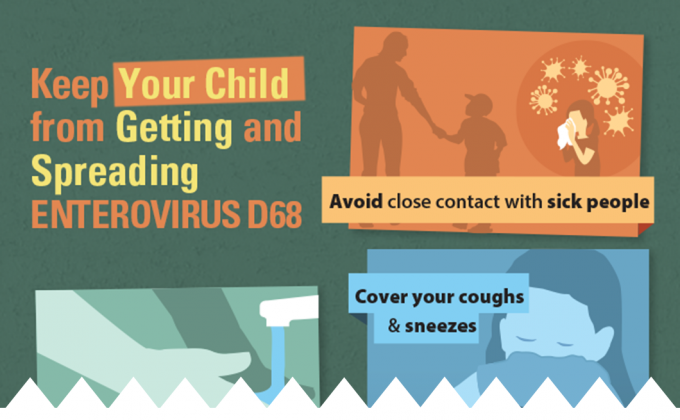Enterovirus D68: What is it and how can I help?
Susan Prosansky, RN, is the Infection Control Nurse for Franciscan Hospital for Children. If you have any questions or concerns regarding Enterovirus D68, please contact us at 617-254-3800 ext. 5550 or info@fhfc.org.

To view the complete infographic, click here.
There has been much talk on the news and social media about a respiratory virus that is causing many children to be hospitalized with coughing and breathing problems that are often severe. Enterovirus D68 is just one strain of Enteroviruses, but it’s an unusual one. Symptoms can include colds, fever, headaches, vomiting and rashes, among others.
Not only is Enterovirus D68 less common than other strains, it can cause especially bad respiratory illnesses, including a bad cough and difficulty breathing. D68 can be especially dangerous for children with existing lung problems (like chronic lung disease and asthma) or who have weaker immune systems (like newborns). Our patient population at Franciscan Hospital for Children is especially vulnerable due to their complex medical problems.
The Centers for Disease Control and Boston Department of Public Health are monitoring the situation closely. Like any other virus, D68 spreads from person to person through bodily fluids like saliva and nasal secretions, as well as through sneezes, handshakes and changing diapers.
Since the virus seems to affect children worse than adults, it is important that adults follow some simple steps in order to prevent the spread of infection. Here are some things you can do to help when visiting Franciscan Hospital for Children:
- Wash your hands often especially after touching your face, blowing your nose or changing diapers. Hand hygiene stations are located at the Urgent Care and Main Lobby entrances for the convenience of all visitors.
- Cover your cough and sneeze with a tissue or your sleeve to prevent the germs from traveling through the air.
- If you are sick, please wait at least 24 hours after your symptoms resolve before visiting a patient.
As always, the care and safety of our patients remains our #1 priority.
Thank you for your preventive efforts and understanding during the height of the Enterovirus season!
For more information about Enterovirus D68, visit the CDC here.
View All Blog Stories